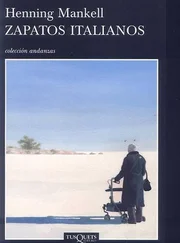Although Dona Esmeralda had never been interested in political matters and was at the time at least eighty years old, she understood early on, presumably from sheer instinct, that the young revolutionaries were going to win the war. A new age would arise, and she would be forced to choose which side to be on. It was not difficult for her to grasp that she belonged with the young revolutionaries. With a mixture of anger and joy she would gladly fight the heavy-footed bureaucracy, which seemed to be the only thing the colonial power had bestowed upon its distant province. She put on the darkest hat she owned, possibly meaning to camouflage her treacherous intentions, and drove her car out of the city, taking the north road. She passed through a number of military roadblocks, where the guards tried in vain to make her turn back, warning that she was now entering areas controlled by bloodthirsty revolutionaries who would confiscate her car, tear off her hat, and then slit her throat. When she continued regardless, they concluded that she was crazy, and it was there, at those roadblocks, that the rumour was born which definitively pronounced Dona Esmeralda to be mad.
It is true that she was stopped by the young revolutionaries, but they neither tore off her hat nor slit her throat. On the contrary, they treated her kindly and with respect. At one of the nearby encampments a commandant questioned her as to why she was travelling all alone in her big open car. She stated briefly that she wanted to enlist in the revolutionary army, and she pulled out of her handbag a rusty old cavalry pistol that had belonged to her father. The young commandant, whose name was Lorenzo and who would later end up in disgrace because of a ferocious lust for other men's women, sent her on to a base sixty miles farther into the bush to an officer higher up the chain of command who would be better able to determine what should be done about Dona Esmeralda.
This man, whose name was Marcelino and who was a brigadier general in the revolutionary army, was familiar with the old governor Dom Joaquim. He welcomed Dona Esmeralda, gave her a uniform cap in exchange for her motley hat, and personally handled her briefing in the ideological doctrines of the revolution. Then he sent Dona Esmeralda to a mobile field hospital, where he thought she might do the most good. Under the direction of a team of Cuban doctors she soon learned to assist with complicated operations. That was where she stayed for the rest of the colonial war. When the new leaders at last made their jubilant entry into the city, the populace watched with astonishment as the convertible, which they recognised at once but which they had not seen on the streets for a number of years, reappeared with Dona Esmeralda driving and with one of the revolutionary leaders standing behind her, waving. In the chaos that prevailed during that intoxicating time after the liberation, she was asked by the new president what role she would like to play in the revolutionary transformation of the old society which was now being initiated.
'I want to start a theatre,' she replied without hesitation.
Surprised, the President tried to persuade her to assume a role of greater revolutionary moment, but she was insistent. When the President saw that he would not be able to change her mind, he issued a decree, which he later had the Minister of Culture confirm, stating that Dona Esmeralda would be in charge of the city's only theatre building.
The new era had begun. Dona Esmeralda was so preoccupied with her new life that she didn't seem to notice that the statues, which her father had gone to so much trouble to acquire upon the demise of various dictators, had once again been toppled and were being transported to an old fortress, where they were either stored or melted down. The city, which up until then had been branded by her invented ancestors, was now transformed without her noticing it. She spent all her time inside the dark and decrepit theatre, which had long stood abandoned. It had fallen into a sewer-like condition; the stench was horrific, and the rats, as plump as cats, ruled the stage where old sets stood and rotted.
With furious energy Dona Esmeralda declared war on the rats and the stench and then threw herself into a strenuous campaign, resolved to reconquer the theatre, which sat like the wreck of a ship in the sludge. No one who saw her during this time failed to observe that Dona Esmeralda's madness had now become full-blown. With disgust and poorly concealed contempt, people decided that she was expending her energies on an absolutely useless task, the greatest sin that anyone could commit. After a while she managed to win the help of some young people who were both unemployed and ignorant of what a theatre was all about. Dona Esmeralda used to say by way of explanation that it was like film without a projector'. When she held out the illusory possibility that the young people might one day try their skill on the stage – which was still half buried in the overflowing sewer – she managed to persuade them to hitch up their skirts, roll up their trouser legs, and slog around in the muck, chasing the rats with sticks and lugging out all the rotting stage sets.
After six months she had made so much headway that she had reclaimed both the stage and the hall with its rickety red plastic seats, and she was finally able to get the electrical wiring to function as well. It was a big moment when she turned on the lights for the first time. Two thirty-year-old spotlights simultaneously exploded with powerful blasts. But for Dona Esmeralda they were like saluting rockets. Now she could at last see her theatre. And what she saw convinced her that she was right, although nobody else had any idea what was in her mind.
Six months more and she had gathered around her a group of similarly inclined people, and she had written a play about a halakawuma who was constantly giving the King bad advice. It was a play that took more than seven hours to perform. Dona Esmeralda built the sets, sewed the costumes, directed the actors, and played those parts herself which she had not been able to find anyone else to fill.
On a December evening the theatre was to be re-inaugurated. She had sent invitations to the President and the Minister of Culture, who was not entirely pleased that Dona Esmeralda had refused the good advice of the Ministry's many bureaucrats about how the theatre might best be run. A strong rain storm shorted out the electrical circuits just as the performance was about to begin. The President had sent his regrets, but the corpulent former shoemaker, Adelinho Manjate, who was now the Minister of Culture by virtue of his success as a dancer during his years as a revolutionary soldier, was in attendance. The performance was delayed for several hours. The rain poured through the roof on to the festively clad but increasingly disgruntled audience.
It was past ten o'clock by the time Dona Esmeralda was able to switch on the spotlights again and the first actor, who had forgotten his lines, stepped on to the stage. The performance turned out to be a peculiar experience. It went on until dawn the following morning. None of those present, perhaps least of all the actors, fully understood what the play was about. On the other hand, none of those in attendance ever forgot what they had been part of. Dona Esmeralda, finally alone on the stage at first light, was filled with that singular sense of joy which only those who have achieved the impossible can feel. She thought nostalgically of her father, the old governor, who had not been there to witness this proud moment, and then she realised she was hungry. During the past year she had scarcely had time to eat.
She went out into the city. The rain had stopped and there was a fresh scent from the blooming acacia trees that lined the main streets. She regarded the people she met with curiosity, as if she were noticing for the first time that she was not alone in the city. And she discovered that all of the statues with which her father had adorned the plazas had disappeared. For a moment she felt old, sad that the new era clearly meant that nothing would remain as before. But her triumph was stronger than her sorrow, and she cast off her melancholy thoughts. She stopped at a café, sat down at a table, and ordered a glass of cognac and some bread. As she pondered how she was going to find the money to continue to operate the theatre, she chewed on the bread. That was when it occurred to her that the old ticket office and the abandoned café in the foyer of the theatre could be revamped as a bakery. By selling bread she could earn the money she needed. She ate the rest of the bread, stood up, and returned to the theatre to start the process of cleaning up, to make room for the dough blender and the ovens. To obtain funds for the necessary investments, she sold her car to an official at the British Embassy, and three months later she opened the doors to the bakery.
Читать дальше












